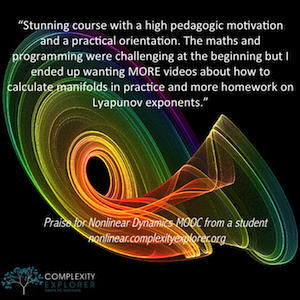
- 09 Sep 2016
Course Updates
The courses keep on coming! Liz Bradley's excellent course, Nonlinear Dynamics: Mathematical and Computational Approaches, is now live! Professor Bradley and her TA Jessica Petty will be guiding a new batch of students through the course. If you haven't taken this course before, now is a great time! If you've taken it before, we could use your help getting the word out to new students. Share the course with your network, encourage a friend to join in, let other people know how much you liked it by reviewing the course on Class Central.
Melanie Mitchell's Introduction to Complexity is open for enrollment now, and this, as most of you know, is the best way for anyone even remotely interested in complexity to get a flavor for it and inevitably become addicted to studying complex systems. You can help by sharing this course, too! Melanie will be updating a few of the course interviews (for example, with Doyne Farmer, Simon DeDeo, Jen Dunne, and Sam Bowles), so if you have taken the course before, you might want to check in and look for those.
Introduction to Agent-based Modeling is zooming along, with the students starting to dig into developing their course projects. We are no longer accepting tuition payments for the course as of September 9th. That is to ensure that anyone enrolling and paying could potentially catch up and submit the project work before the first deadline. The first unit is of course completely open to everyone, and the course videos and quizzes will become available under the Archived Courses section once the session closes.
Website Development
The Agent-based Modeling course is serving as a test bed for new web features we have been working hard on developing. The most exciting one is our peer review system. During the course, Professor Rand will be assigning project work, students will submit their work to the site by a certain deadline, and then they will receive submissions from three other students to review, following a rubric provided by the instructor. This will allow a lot more hands on learning and it will be fascinating to see what the students come up with!
Another development is with our course forums. We have upgraded these to include messaging. When you are in a course forum, you will now see a little turquoise box on the bottom right that says Messages. You can click that to see your messages. In order to message someone, you can click on their name on a forum post. This should help facilitate the formation of study groups, group project work, etc. Experiment with this system and let us know how it works!
As a reminder, for the Agent-based Modeling course we developed a paid tuition system. This system works in the following way. Courses that have a padlock on their icon are paid courses. That means that when a course session starts, the first unit will be free, and the rest of the course is accessible after a minimum tuition. Once a course closes, then the videos and quizzes are freely available under Archived Courses. In order to pay the tuition, you must be registered and enrolled. Once a student pays, the course will be open to them as the instructor publishes the units. You can tell if you have full access by going to your profile: click on your name in the top right of the Complexity Explorer page, and then click through to My Enrollments. You will see the course name with either an unlocked padlock or a trophy if you have access. This note will be added to the website FAQs and we will post it again the next time we have a paid course session (most likely in 2017 with the future Complexity Economics MOOC).
As a result of all of this development, our "How to use Complexity Explorer" video is out of date. We have a few more important developments on the horizon, and once those are stable we will reshoot our How-to video to reflect these changes.
Tutorial and Virtual Lab Status

We had hoped to have the Fractals Virtual Lab Series available for you, as well as the Introduction to Computation Theory tutorial, by now. They are very close to being completed. Joshua Grochow is reviewing the videos for the Computation tutorial, and creating quizzes and homework. We have nearly completed some web development essential to bringing you the Virtual Lab. Both of these pieces should be coming to you soon. We have also finished filming for Simon DeDeo's Introduction to Renormalization tutorial. Look out for Q&A's with both Joshua Grochow and Simon DeDeo in the near future.
Subtitle Project News
Thank you so much to all of our hard-working subtitle volunteers! This past month has seen a flurry of activity in our Amara team, and at least one volunteer, Daniella, has earned a t-shirt. We sent it out to Italy to her this week! We have now added the videos from the Information Theory and the Vector and Matrix Algebra tutorials to our subtitle team - help us caption and subtitle these videos by joining our team.
We are introducing a new reward for subtitle volunteers. This comes as a direct suggestion from one of our Complexity Explorers. Currently, when a volunteer completes 120 minutes of subtitling, we offer them a Complexity Explorer t-shirt mailed to them anywhere in the world. Now, we are offering an option: either the t-shirt, OR credit towards a paid course session. In other words, if you complete 120 minutes of subtitling, you can request access to one paid course in the future. So, any of you interested in 2017's Complexity Economics MOOC, or in the next offering of Agent-based Modeling, should consider joining the subtitle team and start working towards your free pass!
Funding Model News
We mentioned previously that our minimum tuition model for certain courses in session was a trial run with the Introduction to Agent-based Modeling course. As of September 7th, 499 students contributed $50 or more to take part in the ABM course. We raised over $25,000, which is the cost of developing, hosting and running one brand new course on Complexity Explorer. Thank you to all of our paid students! We also made 300 scholarships available to students who did not have the means to pay for the course. In comparison, we have raised less than $2,000 in donations since January 2016. We thank those students who choose to donate as well! Funds raised in 2016 will help cover funding gaps in 2017 and provide us with starter funds for 2018, when we will no longer have any grant funding. The tuition and donation contributions are essential to the future of the Complexity Explorer project, particularly as our longer-term funding plans take a while to develop. Thank you for supporting our efforts, and the Santa Fe Institute. You can read more about the tution experiment here.
